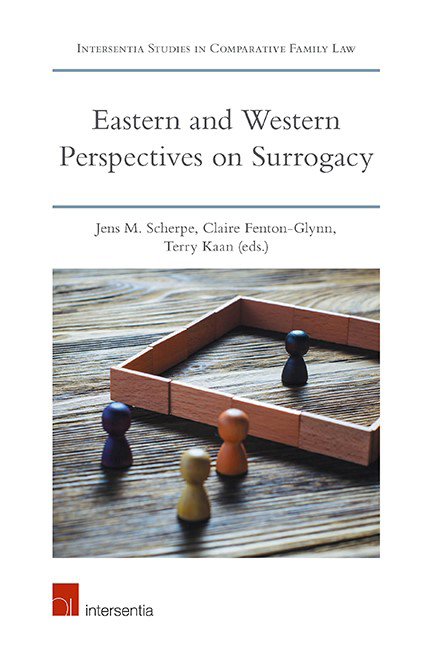Book contents
- Frontmatter
- Preface and Acknowledgements
- Contents
- List of Contributors
- Introduction
- Questionnaire
- PART I WESTERN PERSPECTIVES
- THE PROHIBITIVE APPROACH
- THE TOLERANT APPROACH
- THE REGULATORY APPROACH
- THE FREE MARKET APPROACH
- THE INFLUENCE OF INTERNATIONAL COURTS
- PART II EASTERN PERSPECTIVES
- THE PROHIBITIVE APPROACH
- China
- Taiwan
- Singapore
- A TOLERANT APPROACH?
- REGULATION THROUGH PROFESSIONAL MEDICAL BODIES
- FROM FREE MARKET TO REGULATION
- PART III COMPARATIVE PERSPECTIVES ON SURROGACY
- Index
- About the Editors
Singapore
from THE PROHIBITIVE APPROACH
Published online by Cambridge University Press: 26 June 2019
- Frontmatter
- Preface and Acknowledgements
- Contents
- List of Contributors
- Introduction
- Questionnaire
- PART I WESTERN PERSPECTIVES
- THE PROHIBITIVE APPROACH
- THE TOLERANT APPROACH
- THE REGULATORY APPROACH
- THE FREE MARKET APPROACH
- THE INFLUENCE OF INTERNATIONAL COURTS
- PART II EASTERN PERSPECTIVES
- THE PROHIBITIVE APPROACH
- China
- Taiwan
- Singapore
- A TOLERANT APPROACH?
- REGULATION THROUGH PROFESSIONAL MEDICAL BODIES
- FROM FREE MARKET TO REGULATION
- PART III COMPARATIVE PERSPECTIVES ON SURROGACY
- Index
- About the Editors
Summary
GENERAL LEGAL FRAMEWORK
THE GENERAL LEGAL FRAMEWORK AND SOCIAL BACKGROUND
Singapore has no legislation that deals directly with surrogacy by that name. But the lacuna is not an oversight. The Singapore Parliament is well aware of the issues, given that the formal regulation of surrogacy has been urged upon the government of the day in recent Parliamentary debates. This does not, however, mean that surrogacy is beyond the reach of regulation or formal law in Singapore. As will be explained later in this chapter, Singapore does however have a number of legislative enactments that, together with executive instruments having the force of subsidiary legislation, impose clear and enforceable legal restrictions on the conduct of surrogacy arrangements within Singapore. Further, some of these legal provisions have extra-territorial reach, and have the potential to affect surrogacy arrangements involving a party or parties having a sufficient connection to Singapore as defined by the law.
It may be useful at this point to set out briefly the key features of the constitutional and legal framework in Singapore in order to understand the development of the regulatory regime for surrogacy in Singapore, and in particular, the impact of English common precedents on local judicial decisions. From 1819 to 1963, Singapore was a British colonial possession before its merger with the new state of Malaysia in 1963. In 1965, Singapore became an independent country after peaceful secession from Malaysia by mutual agreement. Like many former British colonies, it inherited a constitutional system of the Westminster model, but with an elected President replacing the monarch, and a unicameral Parliament instead of a bicameral one. More than half a century after ceasing to be a British Crown Colony, the English common law continues to play the dominant role in its constitutional and legal system.
The habit of adherence to the English common law has deep historical roots some two centuries old in the form of the Second Charter of Justice 1826 by which the Crown decreed that English law should be applied to its new possessions in the Straits of Malacca, including Singapore. Formal legal links between the United Kingdom and Singapore continued after independence with the Judicial Committee of the Privy Council being constituted as the highest court of appeal within the legal system.
- Type
- Chapter
- Information
- Eastern and Western Perspectives on Surrogacy , pp. 397 - 416Publisher: IntersentiaPrint publication year: 2019



